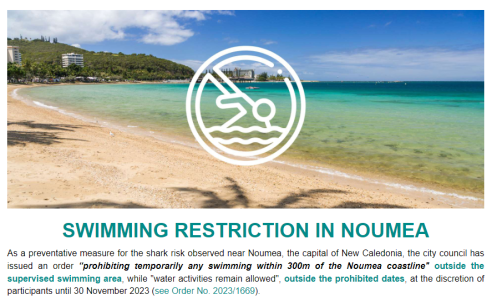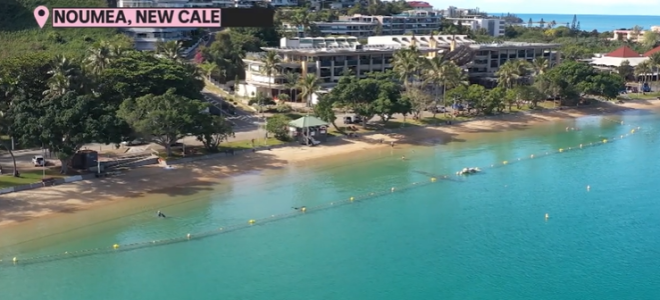Tourists condemning 'stupid' beach ban after Aussie’s fatal shark attack, New Caledonia bar owner claims
Many beautiful countries in the Pacific are hotspots for tourists.
With their gorgeous beaches and thriving wildlife, it’s no wonder why a lot of people around the globe are making their way to these islands.
One such destination is New Caledonia, located in the South Pacific and east of Australia. But, despite the influx of tourists, they placed a strict ban on ocean swimming after a 59-year-old Australian was killed by a shark.
The tragedy occurred on a crowded beach in Nouméa, the island country’s capital, last February.
In response, the city took drastic measures to prohibit swimming in the ocean and placed a 200-metre stretch of netting in the capital.
Unfortunately, while this ban is temporary, it has had unforeseen consequences for the island nation.
Tourism operators have reported that business has been reeling by an estimated 60 per cent drop as visitors abandon the destination for fear of what might happen if they enter the water.
More than that, business owners who rely on tourists are suffering the effects of the ban.
‘When tourists arrive and see our beaches closed, honestly, they find that stupid because where they come from, shark attacks occur, and they're worse than here,’ Francisco Maie, who owns a bar near a beach, told a news source.
‘Certainly, the economic impact has affected our work, that’s for sure,’ he added.
Nouméa's City Council Secretary-General, Romain Paireau, said the ban was necessary to restore trust in the country as a tourist destination and maintain its reputation.
'We don't want to be known as the “shark islands” in the long term,' he said.
This follows the island’s commitment to shark culling. Council bosses maintained that culling, alongside the swimming ban, would be enough to get people back into the ocean.
Some companies have supported this move, installing shark nets to protect swimmers. But their effectiveness is questionable.
Back home, according to the New South Wales government data, only 24 of the 204 creatures caught in nets during the 2022/2023 season were target species, hinting that the use of shark nets may harm more marine life in the long run.
One possible explanation for the rise in New Caledonia's shark attacks over the last few decades could be repealing the tiger and bull shark fishing ban that was in place for several years until 2021.
Once the ban was lifted, reports say the populations of those shark species swelled–leading, presumably, to the increased chances of attacks.
You can watch ABC Pacific’s coverage of the ban here:

What do you think of this story, members? Share your thoughts in the comments below!
With their gorgeous beaches and thriving wildlife, it’s no wonder why a lot of people around the globe are making their way to these islands.
One such destination is New Caledonia, located in the South Pacific and east of Australia. But, despite the influx of tourists, they placed a strict ban on ocean swimming after a 59-year-old Australian was killed by a shark.
The tragedy occurred on a crowded beach in Nouméa, the island country’s capital, last February.
In response, the city took drastic measures to prohibit swimming in the ocean and placed a 200-metre stretch of netting in the capital.
Unfortunately, while this ban is temporary, it has had unforeseen consequences for the island nation.
Tourism operators have reported that business has been reeling by an estimated 60 per cent drop as visitors abandon the destination for fear of what might happen if they enter the water.
More than that, business owners who rely on tourists are suffering the effects of the ban.
‘When tourists arrive and see our beaches closed, honestly, they find that stupid because where they come from, shark attacks occur, and they're worse than here,’ Francisco Maie, who owns a bar near a beach, told a news source.
‘Certainly, the economic impact has affected our work, that’s for sure,’ he added.
Nouméa's City Council Secretary-General, Romain Paireau, said the ban was necessary to restore trust in the country as a tourist destination and maintain its reputation.
'We don't want to be known as the “shark islands” in the long term,' he said.
This follows the island’s commitment to shark culling. Council bosses maintained that culling, alongside the swimming ban, would be enough to get people back into the ocean.
Some companies have supported this move, installing shark nets to protect swimmers. But their effectiveness is questionable.
Back home, according to the New South Wales government data, only 24 of the 204 creatures caught in nets during the 2022/2023 season were target species, hinting that the use of shark nets may harm more marine life in the long run.
One possible explanation for the rise in New Caledonia's shark attacks over the last few decades could be repealing the tiger and bull shark fishing ban that was in place for several years until 2021.
Once the ban was lifted, reports say the populations of those shark species swelled–leading, presumably, to the increased chances of attacks.
You can watch ABC Pacific’s coverage of the ban here:
Key Takeaways
- A temporary ban on ocean swimming has been imposed in New Caledonia after a fatal shark attack occurred in the capital of Nouméa earlier this year.
- The decision has been criticised by both locals and tourists and has led to a significant fall in local tourism–reportedly by 60 per cent.
- Alongside the ban, a commitment to shark culling has been made, with plans to install shark nets also in place. However, the effectiveness of such nets has been debated due to the high number of non-target species caught.
- A rise in shark attacks in New Caledonia could be linked to a ban on tiger and bull shark fishing, which was in place until 2021.
What do you think of this story, members? Share your thoughts in the comments below!
Last edited by a moderator:









